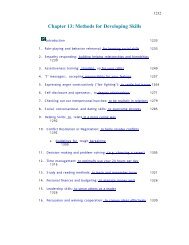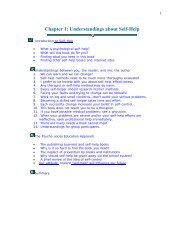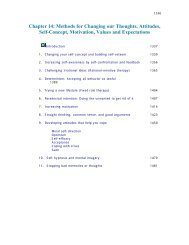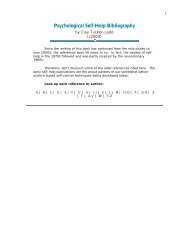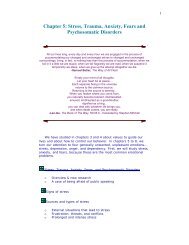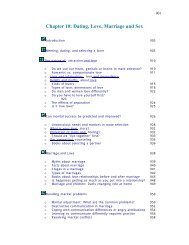Chapter 3: Values and Morals:Guidelines for living - Psychological ...
Chapter 3: Values and Morals:Guidelines for living - Psychological ...
Chapter 3: Values and Morals:Guidelines for living - Psychological ...
Create successful ePaper yourself
Turn your PDF publications into a flip-book with our unique Google optimized e-Paper software.
10. My goal in life is to be happy, to have a good time. I care about<br />
others, yet I also have a right to whatever I can earn or<br />
achieve through my own honest ef<strong>for</strong>ts. I want to enjoy life. My<br />
first obligation is to see that my family <strong>and</strong> I have everything<br />
we want. I can't help others unless I am happy, so that comes<br />
first.<br />
Agree Disagree<br />
1 2 3 4 5<br />
If you answered the basic question "no," you would be more likely<br />
to agree with the first 3 or 4 statements which support the Golden<br />
Rule. If you feel positive towards the basic question, you will agree<br />
more with self-centered statements like 5 to 10. These latter<br />
statements are the common rationalizations in our culture <strong>for</strong> not<br />
helping others in need; check to see if your answers reveal some of<br />
your self-excuses or escape mechanisms (as discussed by B<strong>and</strong>ura<br />
below).<br />
Obviously one could pursue both happiness (choices 7, 8, & 9<br />
above) <strong>and</strong> the Golden Rule (choices 1, 2, & 3) on a part-time basis<br />
(<strong>and</strong> most of us do), or, if one were very <strong>for</strong>tunate, one might<br />
experience great happiness in life while helping others. The reverse is<br />
very unlikely, i.e. doing great good while primarily seeking personal<br />
enjoyment.<br />
What is wrong with putting your happiness <strong>and</strong> financial<br />
success first? (i.e. get yours first, like trickle down economics.)<br />
You often hear comments like, "you have to look out <strong>for</strong> yourself"<br />
or "those people really know how to live...how to party" or "you have<br />
to be happy yourself be<strong>for</strong>e you can help others be happy." All are<br />
very common justifications <strong>for</strong> happiness. But, who is happiest, the<br />
person devoted to having fun or the person devoted to helping others?<br />
Riml<strong>and</strong> (1982) did a very simple experiment. Why don't you try it<br />
right now. List the 10 people you know best. Rate each one as either<br />
happy or unhappy. Then, rate each one as self-centered or otherscentered.<br />
Riml<strong>and</strong> found that happy people were ten times more likely<br />
to be unselfish than selfish. I rest my case. It is strange that happiness<br />
comes to people who have decided not to seek it as their main<br />
purpose in life. It comes as a fringe benefit to helpers.<br />
There is accumulating evidence that striving <strong>for</strong> power, fame,<br />
wealth, <strong>and</strong> material goods--big parts of the "American Dream"--more<br />
than <strong>for</strong> good relationships, personal growth, <strong>and</strong> altruism is<br />
associated with more anxiety, more depression, <strong>and</strong> poorer general<br />
functioning (Kasser & Ryan, 1993). In short, materialism may be bad<br />
<strong>for</strong> your mental (<strong>and</strong> spiritual?) health. As Fromm (1976) observed, a<br />
focus on "having" distracts us from "being" our best person.<br />
31




